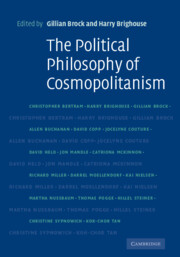Book contents
- Frontmatter
- Contents
- List of contributors
- Preface
- 1 Introduction
- 2 Principles of cosmopolitan order
- 3 Territorial justice and global redistribution
- 4 International justice and the basic needs principle
- 5 Cosmopolitans, cosmopolitanism, and human flourishing
- 6 Global justice, moral development, and democracy
- 7 A cosmopolitan perspective on the global economic order
- 8 In the national interest
- 9 Cosmopolitan respect and patriotic concern
- 10 Persons' interests, states' duties, and global governance
- 11 The demands of justice and national allegiances
- 12 Cosmopolitanism and the compatriot priority principle
- 13 Beyond the social contract: capabilities and global justice
- 14 Tolerating injustice
- 15 Cosmopolitan hope
- Bibliography
- Index
5 - Cosmopolitans, cosmopolitanism, and human flourishing
Published online by Cambridge University Press: 04 December 2009
- Frontmatter
- Contents
- List of contributors
- Preface
- 1 Introduction
- 2 Principles of cosmopolitan order
- 3 Territorial justice and global redistribution
- 4 International justice and the basic needs principle
- 5 Cosmopolitans, cosmopolitanism, and human flourishing
- 6 Global justice, moral development, and democracy
- 7 A cosmopolitan perspective on the global economic order
- 8 In the national interest
- 9 Cosmopolitan respect and patriotic concern
- 10 Persons' interests, states' duties, and global governance
- 11 The demands of justice and national allegiances
- 12 Cosmopolitanism and the compatriot priority principle
- 13 Beyond the social contract: capabilities and global justice
- 14 Tolerating injustice
- 15 Cosmopolitan hope
- Bibliography
- Index
Summary
Debates about equality tend to take as their context the relations among citizens in a single society. Yet problems of inequality obviously go beyond a particular territory or country. The greatest equality gaps are no longer, as they were a hundred years ago, between rich and poor persons within a country, but between rich and poor peoples: problems of inequality are most egregious between the haves and have-nots in the international context. And yet we lack the capacity to redress global injustice: institutional resources, human motivation and the concepts of political philosophy all presume the predominance of the nation-state paradigm and obligations among citizens. As one prominent commentator puts it, “liberal goals are achieved in a liberalized societal culture or nation” (Kymlicka, 2001, p. 216). Thus perhaps the toughest test of an egalitarian theory is what it can contribute to the promotion of equality, not among citizens, but around the globe. In this essay I argue that problems of international justice are illuminated by a theory of egalitarianism that is committed to equalizing the conditions of human flourishing. If we are to make human beings in the world more equal, then we must consider how cultural practices affect human flourishing. My argument casts doubt on the coherence of neutralist concepts of justice that, in either local or global applications, avoid any commitment on matters of value.
Few egalitarians would dispute that richer peoples have duties of redistribution to poorer peoples.
- Type
- Chapter
- Information
- The Political Philosophy of Cosmopolitanism , pp. 55 - 74Publisher: Cambridge University PressPrint publication year: 2005
- 13
- Cited by



